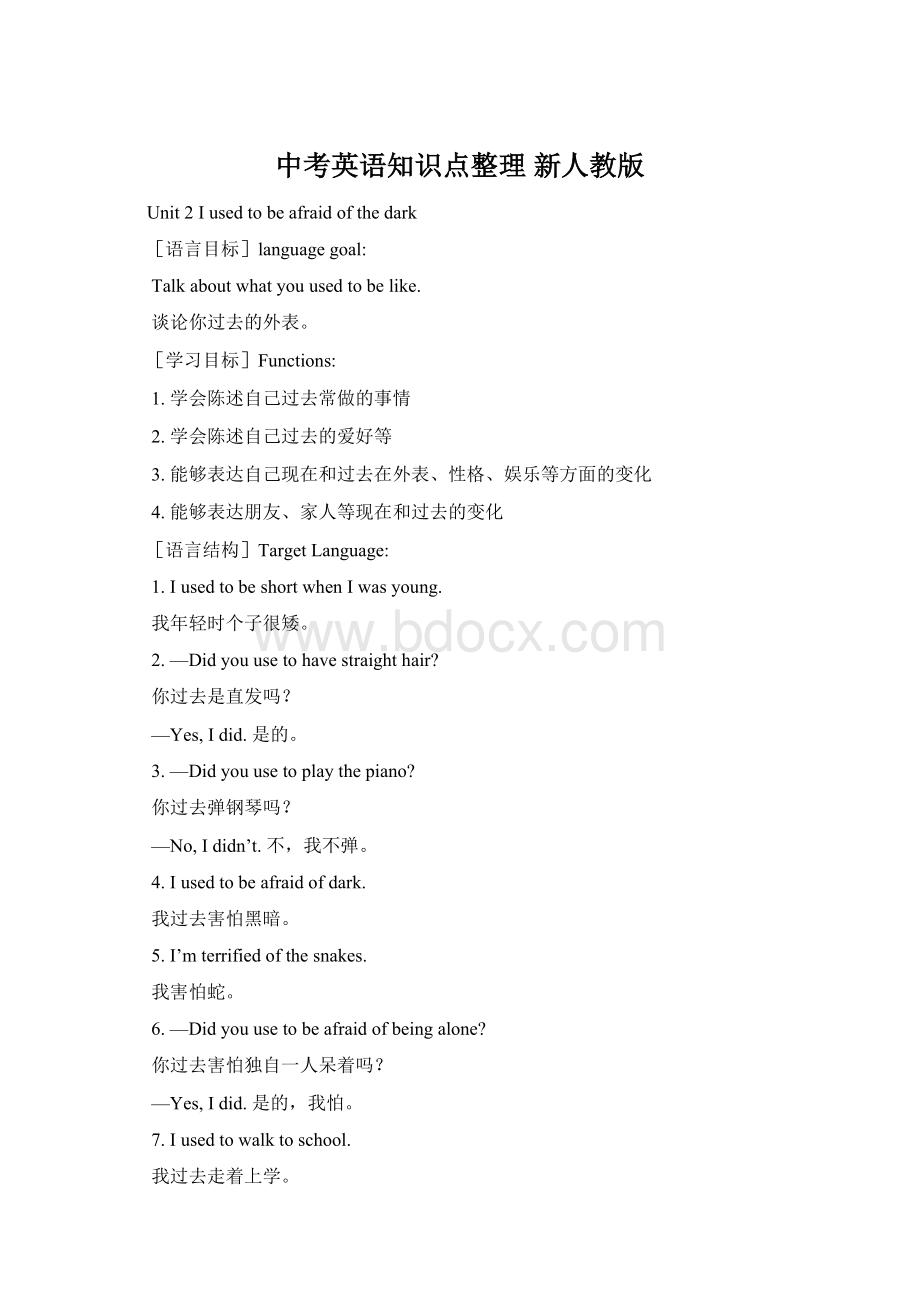中考英语知识点整理 新人教版Word文档下载推荐.docx
《中考英语知识点整理 新人教版Word文档下载推荐.docx》由会员分享,可在线阅读,更多相关《中考英语知识点整理 新人教版Word文档下载推荐.docx(13页珍藏版)》请在冰豆网上搜索。

[主要词汇]Vocabulary:
dark黑暗sure无疑,确实terrify使害怕,使恐惧
on接通的,工作着的spider蜘蛛insect昆虫
chew嚼,咀嚼gum口香糖right立即,马上
comic连环漫画hardly不十分,简直没有
usedtodosth.过去经常beinterestedin对…感兴趣
beontheswimteam是游泳队成员beafraidof害怕
beterrifiedof害怕withthelighton灯开着做…
worryabout担心chewgum嚼口香糖
thesedays目前,如今not…anymore不再
[词汇复习]recycling:
shorthair短发curlyhair卷发
longhair长发straighthair直发
tall高的short矮的
(be)mediumheight中等身高thin瘦的
heavy重的,沉的(have/has)amediumbuild中等胖瘦
[语法分析]
一、本单元语法重点内容是usedto这个句型。
1.“主语+usedto+动词原形+其它”。
在这个句型结构中usedto的含义为“过去常常”。
表示过去的习惯,暗示现在已无此习惯,请看图:
Dave在过去几年中一直在factory(工厂)中工作,但现在他在Supermarket(超市)中工作,所以Dave
usedtoworkinafactory.隐含的意思是:
Daveworkedinafactorybeforebuthedoesn’twork
therenow.
如果用时间轴表示的话,应该是这样的。
2.我们可以说Iusedtowork…/Sheusedtohave…/theyusedtobe…等等,也就是说used这个词没有人称的变化,to后面接动词原形。
usedto
be
work
have
playetc.
请看例句:
·
WhenIwasachild,Iusedtolikechocolate
IusedtoreadalotofbooksbutIdon’treadmuchthesedays.
Lizhasgotshorthairnowbutitusedtobeverylong.
Liz现在梳短发,但以前她是长发。
Theyusedtoliveinthesamestreetasus,soweoftenusedtoseethem.Butwedon’t
seethemveryoftenthesedays.
他们过去和我们住在同一条街道,所以我们经常能看见他们,但现在我们不能经常见到他们了。
Annusedtohaveapiano,butshesolditafewyearsago.
Ann过去有一架钢琴,但几年前她把钢琴卖了。
usedto的否定形式是Ididn’tuseto….
WhenIwasachild,Ididn’tusetoliketomatoes.
当我还是个孩子时,我不喜欢西红柿。
问句形式是didyouuseto…?
Wheredidyouusetolivebeforeyoucamehere?
当你来这儿之前你住哪儿?
3.usedto这个词组只用于讲述过去,我们不能用useto来讲述现在
Iusedtoplaytennis.ThesedaysIplaygolf.
(不说Iusetoplaygolf.)
Weusuallygetupearly.
(不说Weusetogetupearly)
二、anymore
我们用anymore来表示情况或活动的变化。
(Weuseanymoretoshowachangeinasituationor
activity.)
SheusedtoliveinNewYork,butshedoesn’tlivethereanymore.
如果动词(或动词短语)相同,则第二个动词可省略。
(IftheSecondVerbphrasehasthesame
verb,youcanomitit.)
SheusedtoliveinLondon,butshedoesn’tanymore.
anymore可不与usedto连用(Youcanuseanymorewithoutusedto)
Shedoesn’tliveinNewYorkanymore.
anymore只能和否定词连用
Wedon’tgothereanymore.
Theynevertalktomeanymore.
Noonelikeshimanymore.
三、still
我们用still来说明某人或某物没有变化。
(Usestilltoshowthatsomethingorsomeonehasnot
changed)
ShestilllivesinMexico.
still应放在主要动词前面(Usestillbeforethemainverb)
HestilllivesinNewZealand.
still应放在be动词后面。
Heisstillcrazyafteralltheseyears.
still应放在像can,may,should这样的助动词之后
Shecanstillplaythepiano.
四、频率副词
频率副词(如always)在句中位置不同。
(Adverbsoffrequencycanappearindifferent
positionsinasentence.)
它们的位置应是:
在主要动词之前,在be动词之后,在助动词(will,can,have等)之后,在usedto之前。
Iusuallygetupatsix.
Youwererarelyhappy.你很少高兴。
Youwillsometimeshearfromthem.
Ihaveseldomspokentoher.
Theyneverusedtodance.
Healwaysusedtocallher.
五、词语辨析
1.usedto和would
①usedto和would都可表示过去的习惯或行为,常可换用。
Whenwewerechildrenweusedto/wouldgoskatingeverywinter.我们小时候每年冬天都去滑冰。
②usedto含有较强的“今昔对比”的含义,而would无此含义
IdonotswimsooftenasIusedto
我不像过去那样常游泳了。
(不能用would代替)
Hewouldsometimesworkintothenight.
以前他常工作到深夜。
(不表示现在他不工作到深夜)
③用would时,有时应有时间状语来加以限制,而usedto则可无时间状语
HewouldgotoseeMothereveryvacation.
(那时)他每个假期去看望妈妈
Heisn’twhatheusedtobe.他不再是过去的他。
2.usedtodo和beusedtodoing.
①beusedto是“习惯于”某一客观事实和状态,不强调动作,to是介词,后面接名词或动名词,
如:
Iamusedtotheweatherhere.
我已经习惯于这里的天气了。
Heisusedtohardwork.他习惯于艰苦的工作。
②get(或become)usedto指的是从不习惯到习惯这一过程的转变,另外,它往往包含着克服困难去适应的意思。
如:
Youwillsoongetusedtotheweatherhere.
你会习惯于这里的天气的。
Intheend,Igotusedtodoingthehardwork.
最后,我终于习惯干苦活了。
[单元课文重点分析]
1.I’montheswimteam.(SectionA2b)
我是游泳队成员。
类似的说法还有:
I’monthesoccerteam或Iplayonthesoccerteam.
2.Peoplesurechange.(SectionA2b)
人们的确是要变的。
sure在这里为副词。
Itsurewascold.天气确实很冷。
3.Areyoustillafraidofthedark?
I’mterrifiedofthedark.
(SectionA3b)
afraid的词组有beafraidofsth害怕某物
She’safraidofdogs.
He’safraidofseeingstrangers.
在口语中也说I’mafraidhe’soutatthemoment.
我想他现在出去了。
beterrifiedofdoingsth是个同义词组。
I’mterrifiedofbeingalone.
我害怕独自一人呆着。
4.Igotosleepwithmybedroomlighton.(SectionA3b)
我把卧室的灯开着睡觉。
with的短语表方式
5.课文SectionB3a难点
5.thesedays
“…butthesedaysIgetupearlyandstayinschoolallday.”
thesedays是个词组,意思是“现在,这几天”
Yourson’stroubleisverycommonthesedays.
你儿子的毛病现在是极常见的。
6.right
ThenIgorighthomeandeatdinner.
right在这里是副词,意为“直接地”。
Thewindblewrightinourfaces.
风迎面吹来。
7.haveto
butnow.Ihavetostudy.
haveto意为“必须”侧重于客观上的必要。
其句型为have(has)to+动词原形
Wehavetoleavenow.
HehastoworkonSunday.
IhadtodomyhomeworklastSunday.
8.hardlyever.
Thesedays,Ihardlyeverhavetimeforconcerts.
hardlyever=veryseldom.很少
Hehardlyevergoestobedbeforemidnight.
他很少在午夜以前就寝。
9.miss
Ireallymisstheolddays.
①miss在这里为“怀念”的意思。
HowhemisseshismotherwhilesheisawayinLondon!
他妈妈在伦敦期间,他多么想念她啊!
②此外miss还有“缺”的意思。
I’mafraidthatJimwillmissalotofhislessons.
恐怕Jim会缺很多课。
③错过
Imissedcatchingthe2:
15train.
我未赶上2点15分的火车。
④missing失去的,缺少的,不在的,失踪的。
Theyarelookingforthemissingchild.
他们在寻找失踪的孩子。
10.Itseemsthat…(Selfcheck)
ItseemsthatYuMeihaschangedalot.
Itseemsasifhewouldrecover.
看来他好像会康复的。
Itseemedthatthedaywouldneverend.
那天好像没有尽头似的。
【模拟试题】
一、单词分类。
请将单词或短语按要求分类,(只写序号)
1readcomics2chewgum3.short4getupearly5mediumbuild
6playontheswimteam7sleepwithlighton8playgames
9straighthair10heavy11watchTV12thin13paintpictures
14attendgymclass15eatcandy
A容貌外表__________________________________________________
B生活习惯__________________________________________________
C活动爱好__________________________________________________
二、英英释义。
选出正确的英文解释填入相应的括号内。
1.comica.almostno
2.hardlyb.fillwithfear
3.insectc.booksormagazineswithstoriesintheformofdrawings
4.terrifyd.wingedanimalswith6legs
5.darke.havinglittleornolight
三、单项选择。
1.I___________frustratedwhenIwasn’tsureofthecorrectanswer.
A.maybeB.usedtoC.usedtobeD.usetobe
2.WhenIwasachild,Iusedto___________chocolate.
A.likingB.likeC.likedD.likes
3.___________workinMicrosoft?
A.DidyouusedtoB.Didyouuseto
C.DoyouusedtoD.Doyouuseto
4.Where___________livebeforeyoucamehere?
A.didyouusedtoB.didyouuseto
C.usehetoD.heusedto
5.Noonelikeshim___________.
A.stillB.neverC.anymoreD.too
6.Iam___________ofspiders.
A.terrifyB.terrorC.terrifyingD.terrified
7.Heisafraidof___________strangers.
A.seeB.seeingC.sawD.seen
8.It___________thathehasbeenillforalongtime.
A.seemsB.looksC.looksasifD.seemsasif
9.Ialwaysgotosleep___________thelighton.
A.inB.withC.toD.and
10.Don’t___________aboutthingssomuch.Itwillmakeyoustressedout.
A.afraidB.terrifyC.terrifiedD.worry
四、看图,用usedto完成句子。
五、用usedto或一般现在时完成句子。
1.Iusedtoplaytennis.Istoppedplayingafewyearsago.
2.Doyoudoanysport?
Yes,Iplaybasketball.
3.‘Haveyougotacar?
’‘No,I_______________onebutIsoldit.’
4.George_______________awaiter.Nowhe’sthemanagerofahotel.
5.‘Doyougotoworkbycar?
’‘SometimesbutmostdaysI_______________bytrain.’
6.WhenIwasachild,Inever_______________meat,butIeatitnow.
7.MaryloveswatchingTV.She_______________TVeveryevening.
8.We_______________neartheairportbutwemovedtothecitycentreafewyearsago.
9.NormallyIstartworkat7o’clock,soI_______________upveryearly.
10.Whatgames__________you_______________whenyouwereachild?
六、用usedto或anymore的正确形式填空。
Mygrandmothercomplainsabouthowthingshavechanged,andshesaysthatlife1be
better.
Familiesaren’tfamiliesthewaythey2be.Everyone’sdivorced.(离婚)Ifahusband
andwifearehavingproblemswiththeirmarriage,theydon’tstaytogether3.And
mothers4stayhomeandtakecareoftheirchildren,butnot5.Everyone’sworking.
Noonehastimeforchildren6.
Andthecars!
Noonewalks7;
everybodydrives.We8walkfivemilestoschool
everyday,eveninwinter.
Andpeopledon’ttalktoeachother9.Theyaretoobusytotalk,toobusytoeat,
toobusytothink…
Life10besimple,butitisn’t11.
七、Holly和Greta自从高中以来就是朋友,Greta刚刚参加了他们的20年校庆,在下面的对话中,他们在谈
论他们以前的同学,看图片完成对话,请使用still和anymore的正确形式。
(注意一些句子是否定的)
Holly:
DidyouseeJimJensen?
Heusedtobesowild!
Greta:
Yes,buthe1(be).Helooksveryconservative(保守)now.
Washethininhighschool?
Idon’tremember.
Yes,andhe2(be).
3(he,wear)glasses?
Yes,hedoes.
4(heplay)the